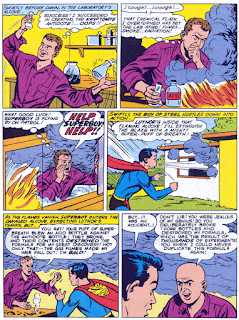Now that a new version of Luthor has made it into film-theaters, it seems appropriate to discuss the first time Superman's arch-villain achieved mythic status.
In some ways it's surprising that the original character caught on so well with 1940s readers of Superman comic, for in his first appearance he seems like just another garden-variety mad scientist, out to conquer the world.
In the second appearance of Luthor-- who had yet to acquire a first name, or even a backstory-- Jerry Siegel gives him one mythic motif: Luthor is a "brain" who perpetually seeks to prove himself the superior of Superman's "brawn." Given that Siegel's first version of Superman, appearing in a prose fanzine, was actually a super-brain with no fabulous physical powers, one might consider this a case of an early version of Superman seeking vengeance on his successor. But this minor motif is as far as Siegel takes it, and it seems to me that the only thing that made Luthor popular with audiences-- enough that he was featured as the main villain in the 1950 ATOM MAN VS. SUPERMAN film-serial-- was that his bald head made him eminently recognizable.
"How Luthor Met Superboy"-- drawn by Al Plastino and written by Jerry Siegel at a time when he had returned to DC Comics as a simple wage-slave-- was an overt attempt to give Superman's most prominent enemy his own myth-- and, as most comics-fans know, it was a myth founded in his lack of head-hair.
The 1960 story-- reprinted in full on this site-- begins with Superboy hearing that a new resident, a teenger, has moved to Smallville. Though the Boy of Steel doesn't typically go around serving as Smallville's welcome-wagon, he shows up at the new boy's farm. At the same a kryptonite meteor crashes to the ground, and Superboy falls victim to its rays. The new boy saves Superboy by pushing the meteor into a nearby lake, after which the young man introduces himself as Lex Luthor, budding boy scientist, and informs the superhero that he Luthor is Superboy's biggest fan-- which was meant to be just as ironic then as when Annie Wilkes spoke similar lines in Stephen King's MISERY.
Grateful for his life, Superboy uses his powers to build the farm-boy-- who's currently living without adult supervision, for reasons loosely explained later-- a brand-new laboratory. Luthor isn't entirely forthcoming about the direction of his experiments, resulting in a clever scene wherein the conflict of the prideful young boy and the somewhat nosy superhero is foreshadowed.
Luthor's attempt to create protoplasmic life may also carry something of a Frankenstein-vibe, though the headless foam-creature seen above never fully comes to life. Luthor is so happy about his breakthrough that he instantly decides to find a new way to reward his super-buddy: by discovering a potion that will immunize Superboy from kryptonite radiation. Since the lab was payback for Luthor saving Superboy's life, one might almost think that on one level Luthor was seeking to use his scientific skills to "one-up" his hero, albeit in a beneficent manner. Luthor's own exultation causes him to start an accidental fire, and Superboy's attempt to save his friend results in a permanent rift between the two:
To be sure, Luthor briefly pretends to set aside his maniacal obsession, but only so that he can taunt Superboy by withholding the kryptonite antidote. "Superboy will regret the day he decided to steal the glory of Luthor," the nascent super-villain rants to himself, which is Siegel elaborating the simple early motif of "brain vs. brawn." Luthor doesn't immediately turn criminal, though, but instead tries to steal from the superhero the regard of the local Smallville residents. Luthor's streak of juvenile carelessness causes the project to turn sour, and Superboy s obliged destroy it.
Luthor tries a second time to ingratiate himself with Superboy's 'worshippers," and he fails again, thus enduring yet more humiliation from an enemy who doesn't regard Luthor as anything but a wayward youth who hasn't received enough parental attention from his "traveling salesman" father. (Nothing whatever is said of Luthor's mother, but one assumes that she's no longer among the living.) Luthor finally crosses the line and tries to kill Superboy, but the young superhero manages to take advantage of the scientist's desire to twist the knife, and save himself.
Still generous to a fault, the Boy of Steel refuses to arrest Luthor for his crime, claiming that Luthor's attempt to take Superboy's life nullifies the scientist's having saved it earlier. This is the only time in the story Superboy shows himself to be something more than a goody-goody, as if he were a juvenile version of a western sheriff, deferring justice from an old friend gone bad.
Many later comics-readers-- and comics-professionals, some of whom worked on later Superman comics-- were affronted by the perceived banality of this motivation; of Luthor becoming a super-villain simply because he lost his hair. In an essay I wrote long ago for AMAZING HEROES, I pointed out that Luthor's baldness was simply an objective correlative for his feeling marginalized and overshadowed by Superboy's prowess. I pointed out that in myths the loss of vitality was sometimes indicated by a character's loss of hair, most famously in the story of Samson, though the Greeks had a not dissimilar character in Nisos, King of Megara. Many later versions of Luthor would minimize the baldness-motif in favor of a Luthor who hated Superman for some other reason, most prominently because of the latter's alien nature.
But regardless of whatever new motive is indicated, that hair-denuded head keeps popping up in every iteration; the 20th-century superhero equivalent of the Fisher King with the Wounded Thigh.
Konga!
14 hours ago







No comments:
Post a Comment